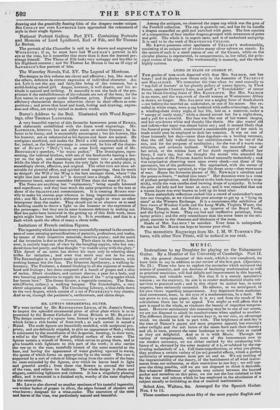MUSI C.
Instructions to my Daughter for playing on the Enharmonic Guitar. By a Member of the University of Cambridge. Part II.
On the general character of this work, which is now completed, we have little to say in addition to our review of the first part. (Spectator, No. 73.) Those who love to explore the mysteries which surround the science of acoustics, and are desirous of becoming mathematical as well as practical musicians, will find delight and improvement in this learned, ingenious, and valuable work. Not that it is a merely speculative treatise ; on the contrary, its aim is to render mathematical truths sub- servient to practical ends ; and in this object its author has, in many respects, been eminently successful. He adheres, as we anticipated, to his own views regarding temperament. Any departure from mathema- tical correctness, must, in the eyes of a mathematician, be a fault. He can prove to you, upon paper, that it is so ; and from the result of his calculations there can be no appeal. You might as well affirm that a part is equal to the whole, as vindicate the beauty of imperfect tempera- ment. However satisfactory this reasoning may be to one of our senses, we are not disposed to admit its conclusiveness when applied to another. The different character of the various keys is, to our ears, an advantage which we should be loth to part with. The brightness of mid-day is the time of Nature's gayest and most gorgeous apparel, but evening's sober twilight and the soft lustre of the moon have each their charms ; and all, in turn present the same landscape to us with tints as varied as they are delightful. And so it is with Music. Through the variety of temperament, which most of the instruments now in use renders necessary, we are either excited by the awakening bril- liancy of D elevated by the sober majesty of E b, or subdued by the cap- tivating melancholy of A I). Call these imperfections, or what you please, they produce a certain variety of (to us) grateful effects which a perfect uniformity of temperament must put an end to. We say nothing of the impracticability of the theory, of the banishment of all wind instru- ments from our orchestras, or their restriction to one key : we will sup- pose the thing possible, still we are not disposed to think it desirable. But whatever difference of opinion may subsist between the learned author and ourselves on this point, we are not the less indebted to him for the time and talents which he has employed in the elucidation of a subject usually so forbidding as that of musical mathematics.


























 Previous page
Previous page